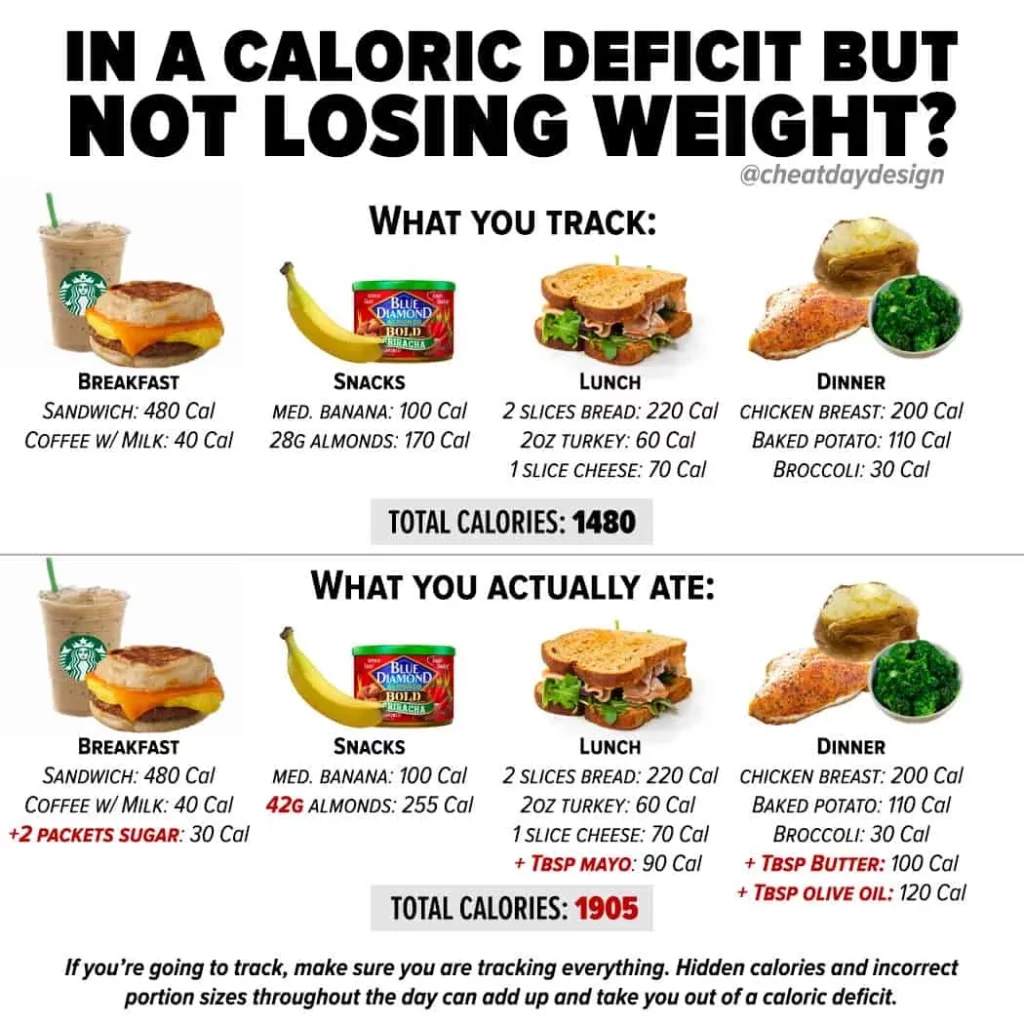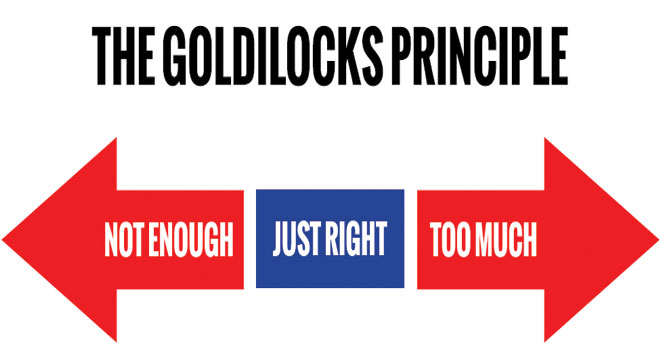- How Much Weight Can You Realistically Lose in 3 Months? - January 14, 2024
- How To Lose 1kg a Week (Guaranteed) - August 20, 2023
- How To Count Calories (or Estimate) and Stay on Track When Eating Out at Restaurants - July 25, 2023
Most people are getting familiar with the fact that a calorie deficit is the underlying principle of weight loss.
The law of thermodynamics dictates that you need to be using more calories than you take in over a long period of time in order to lose weight.
What a lot of people don’t fully grasp however is exactly how big their calorie deficit should be when they’re trying to lose weight.
Many people will mistakenly try to create as large a deficit as they possibly can so they lose weight as quickly as possible.
While this makes perfect logical sense, after all, why wouldn’t you want to lose weight quickly? It doesn’t always work so well in practice.
Why?
If you have a very large calorie deficit, that by definition means you’ll be eating very low calories. For some people, this could mean as little as 800-1200 calories per day, and for most people, that’ll be very difficult to maintain for more than a couple of weeks. If you can’t adhere to your calorie deficit, then it’s kind of pointless.
By the same token, if your calorie deficit is too low, then your weight loss progress will be slow. While this is easier to maintain, it will also be demotivating, which could also end up in you quitting altogether.
This is why it’s so important to get the calorie deficit just right, allowing you to adhere to your target, but also get decent enough results.
The ‘perfect’ size of deficit isn’t one-size-fits-all, it depends on the individual, but a 500 calorie deficit might be good be a good starting point for the majority
WHAT IS A CALORIE DEFICIT?
A calorie deficit is a state of eating fewer calories than you use. If you are in this state over a long enough period of time, weight loss will occur.
The bigger the deficit you’re in, and the longer you’re in it for, the more weight you’ll end up losing.
An average 85kg guy who’s fairly active might use an average of 2,500 calories per day, so if he ate less than this over a long period of time, he’d lose weight.
Of course, in order to calculate your calorie deficit, you’ll first need to calculate your maintenance calories.
WHY A 500 CALORIE A DAY DEFICIT?
You’ll often hear people recommending a 500 calorie deficit. Is it just because it’s a nice round number, or is there something special about it?
It’s likely because a pound of fat contains roughly 3,500 calories, so in theory, if you ate in a 500 calorie deficit every day of the week, you’d lose 1lb of fat in a week.
Using this formula, you’d lose roughly 4lbs per month, which is a fairly decent, sustainable rate of weight loss. This is why an initial calorie deficit of 500 is a good enough starting point for most people.
DOES 3,500 CALORIES REALLY EQUAL 1LB OF FAT?
This is a controversial topic, and while it’s true that a pound of fat does contain 3,500 calories, that doesn’t necessarily mean that eating in a 500 calorie deficit every day will result in a pound of weight loss each week.
While the numbers do stack up nicely, human bodies aren’t robots, and there are other processes at play that mean that even if you did create an exact deficit of 3,500 over a week, you might not lose 1lb.
This may happen for a few reasons;
- Macro split: If you start eating 500 fewer calories everyday, you may eat a different mix of macronutrients. You burn more calories digesting protein than you do digesting carbohydrates or fat, so if you end up having a lower percentage of protein in your diet, you’ll burn slightly fewer calories
- Adaptive thermogenesis; as you lose weight, you do of course get lighter. As you get lighter, the amount of calories you burn at rest, and through exercise, reduces. And no, this isn’t ‘starvation mode‘, you won;t start gaining weight if you calories are too low. So as you get lighter, you’ll need to keep reassessing your maintenance and therefore your calorie deficit. If you don’t, the amount of calories you start out eating that produced weight loss, eventually won’t produce weight loss anymore!
- Reduced activity: Even if you make a conscious effort to carry on doing the same amount of exercise you were before you started eating less calories, the likelihood is that you’ll subconsciously start moving less. This might mean less fidgeting or walking around the house as you body tries to preserve what energy it has
So, while it’s broadly true that a pound of fat contains 3,500 calories, the maths doesn’t necessarily check out perfectly when it comes to weight loss.
WHERE 500 CALORIES MIGHT BE TOO MUCH
While a 500 calorie deficit might be at least a good starting point for most people, it isn’t necessarily going to work for everyone.
Why?
Because for people that are particularly light, 500 calories are going to be a very large percentage of their daily intake.
Let’s take a look at the theoretical maintenance calories for 35-year-old men and women of average heights weighing different amounts, and see roughly how many calories each person would need to eat for weight loss.
N.B. These maintenance numbers are for moderately active people and are ESTIMATES.
MEN
| CURRENT WEIGHT | CURRENT MAINTENANCE | REQUIRED DEFICIT FOR 1LB OF WEIGHT LOSS PER WEEK |
| 60kg | 2362 | 1862 |
| 80kg | 2672 | 2172 |
| 100kg | 2982 | 2482 |
| 120kg | 3292 | 2792 |
WOMEN
| CURRENT WEIGHT | CURRENT MAINTENANCE | REQUIRED DEFICIT FOR 1LB OF WEIGHT LOSS PER WEEK |
| 50kg | 1853 | 1353 |
| 70kg | 2163 | 1663 |
| 90kg | 2473 | 1973 |
| 110kg | 2783 | 2283 |
So, you can see that the calorie intake levels required to produce 1lb of weight loss differ quite drastically between different weights and between genders.
It’s going to be a lot easier for a 120kg male to drop 1lb a week than a 50kg female because he has a LOT more calories to play with (over 1,400 in fact, meaning he can eat over twice the amount). This is down to the simple fact that the 120kg will have a much higher metabolism, and will burn more calories through exercise.
This is why, rather than going for a blanket ‘500 Calorie deficit’, I’d recommend calculating your theoretical maintenance calories, then subtracting 20%.
This will give you a target that takes your current weight into account, rather than a blanket prescription of 500 which will likely be too much for some people.
In this scenario, this would give the 50kg female 1,493 calories per day, rather than 1,353 which will be much easier to stick to.
On the flip side, the 120kg male might even be able to get to a 1000 calorie deficit since it still allows them to eat over 2,000 calories per day! This meta-analysis of thirty-five weight loss studies published in 2011 suggests that it may indeed be easier for heavier people to lose more weight;
“…heavier individuals may reduce their energy intakes by levels that are closer to those prescribed resulting in improved adherence to the energy deficit prescribed, or reduce their intakes to a greater extent than expected or advised. Energy reductions may be easier to implement when starting intakes are higher and therefore the quantity of food may not be perceived to be very small”
Finkler et al., 2011
Of course, this means that as time goes on and participants lose more weight, the rate of loss will decrease, because losing weight gets harder as an ever-decreasing calorie intake is required to continue getting results.
WANT IN TO MY FREE 14-DAY FAT LOSS COURSE? PUT YOUR NAME AND EMAIL ADDRESS IN BELOW;
HOW TO IMPLEMENT A 500-CALORIE DEFICIT
As demonstrated above, cutting 500 calories out of your diet will be much easier if you’re already eating a high number of calories.
It really doesn’t matter how you get your calories down by 500, but here are a few swaps you could try out to get there.
| ORIGINAL | CALORIES | SWAP | CALORIES | CALORIE SAVING |
| 4 whole eggs | 300 | 2 whole eggs, 2 egg whites | 180 | 120 |
| 2 Tablespoons Olive Oil | 240 | 15 Sprays of Frylight | 15 | 225 |
| 150g Ground Beef (30% fat) | 500 | 150g Ground Turkey | 300 | 200 |
| 200g Full Fat Yogurt (5% fat) | 200 | 200g 0% Fat Yogurt | 100 | 100 |
| TOTAL | 645 |
The ‘originals’ are typical foods that form part of a healthy diet, and even they can be swapped for lower calorie alternatives, you can see that even with the few examples I’ve listed here, I’ve been able to save 645 calories which would theoretically equate to over 1lb of weight loss per week.
Of course, if you’re eating unnecessarily snacks like tons of chocolate, cake, cookies or donuts then it’s even easier to cut 500 calories!
Here are some other cool ideas as to how you save 500 calories in a day.

IS A 500 CALORIE DEFICIT SAFE?
For the vast majority of people, a 500 calorie deficit will be perfectly safe. Indeed, the US National Institute of Health recommends a 500-1000 calorie deficit per day to produce a safe rate of weight loss (0.5-1kg per week)
f you’re already very light, i.e. below 50kg, then a 500 calorie deficit may mean you’re eating less than 1,000 calories per day which is is still safe for a period of time, providing you’re filling those calories with a mix of macronutrients, i.e. protein, carbs and fats as well as all the essential micronutrients like vitamins and minerals.
The lower your calories are, the more difficult it is to eat everything you need for optimal health.
Regardless of the size of your deficit, ensure you take regular diet breaks (I’d recommend roughly every 4-8 weeks) to keep you sane and give your body some respite.
SUMMARY
A 500 calorie deficit will work well for most people, and will theoretically get you to a 1lb loss per week, providing you’ve worked out your maintenance calories accurately, and that you’re tracking your calorie intake accurately.
My preferred method however would be to calculate your maintenance calories then subtract 20%, since this takes your current weight into account.
REFERENCES
Rate of weight loss can be predicted by patient characteristics and intervention strategies: https://www.ncbi.nlm.nih.gov/pmc/articles/PMC3447534/
Rate of weight loss can be predicted by patient characteristics and intervention strategies: https://www.ncbi.nlm.nih.gov/pmc/articles/PMC3447534/


Leave a Reply